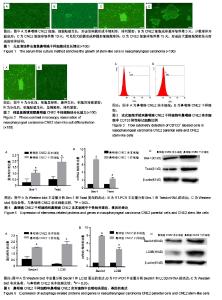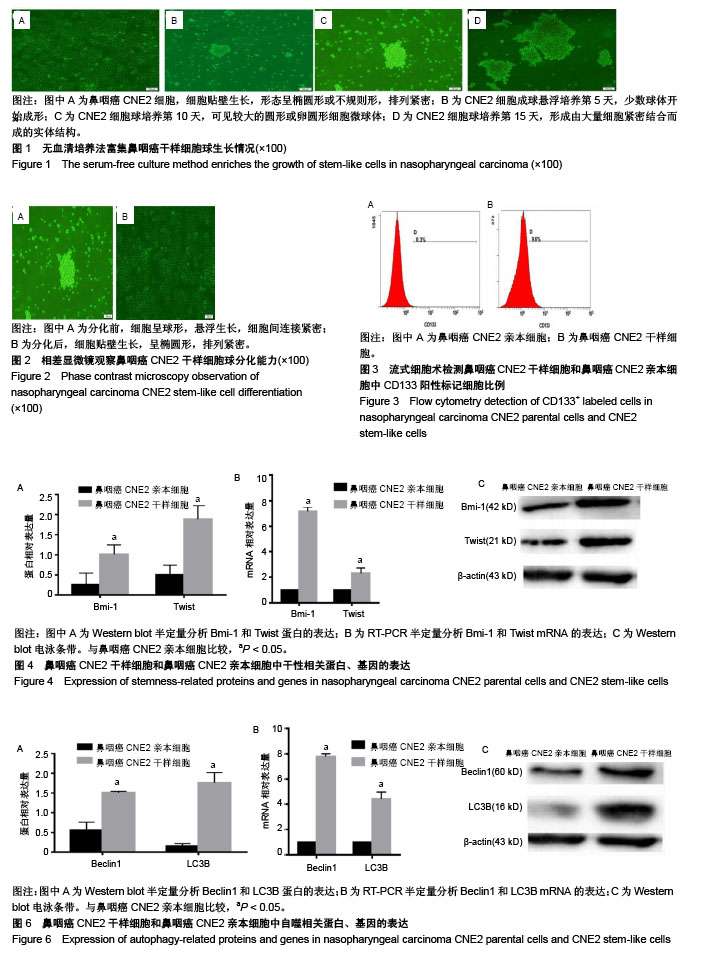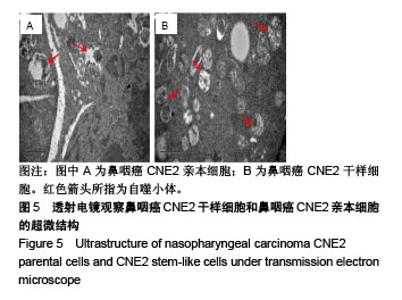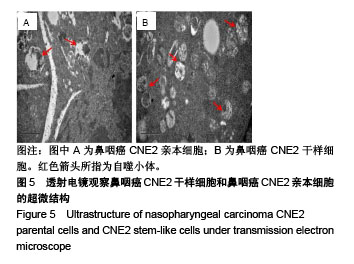Chinese Journal of Tissue Engineering Research ›› 2019, Vol. 23 ›› Issue (17): 2703-2708.doi: 10.3969/j.issn.2095-4344.1718
Previous Articles Next Articles
CNE2 stem-like cells of nasopharyngeal carcinoma have stem cell characteristics and high level of autophagy
Dai Senlin1, Li Xiaoqian2, Wu Jie2, Yue Changwu2, Li Yajun2
- 1Zunyi Medical College, Zunyi 563000, Guizhou Province, China; 2the Third Affiliated Hospital of Zunyi Medical College, Zunyi 563000, Guizhou Province, China
-
Revised:2019-01-28Online:2019-06-18Published:2019-06-18 -
Contact:Li Yajun, MD, Master’s supervisor, the Third Affiliated Hospital of Zunyi Medical College, Zunyi 563000, Guizhou Province, China; Yue Changwu, MD, Master’s supervisor, the Third Affiliated Hospital of Zunyi Medical College, Zunyi 563000, Guizhou Province, China -
About author:Dai Senlin, Master candidate, Zunyi Medical College, Zunyi 563000, Guizhou Province, China -
Supported by:the National Natural Science Foundation of China, No. 81560444 (to LYJ); the Foundation of Guizhou Provincial Science and Technology Department, No. SY[2015]3046 (to LYJ); the United Technology Project, No. [2017]47 (to LYJ)
CLC Number:
Cite this article
Dai Senlin, Li Xiaoqian, Wu Jie, Yue Changwu, Li Yajun. CNE2 stem-like cells of nasopharyngeal carcinoma have stem cell characteristics and high level of autophagy[J]. Chinese Journal of Tissue Engineering Research, 2019, 23(17): 2703-2708.
share this article

2.1 鼻咽癌细胞系干样细胞的形成情况 与普通细胞贴壁生长方式不同,CNE2细胞在无血清培养基中呈悬浮生长,形成立体的细胞球。在培养第3,4天,少数球体开始成形,第6-8天可见较大的圆形或卵圆形细胞微球体,最终在第15天左右形成由大量细胞紧密结合而成的实体结构,见图1。 2.2 鼻咽癌CNE2干样细胞分化能力 鼻咽癌CNE2干样细胞在无血清培养液中培养形成悬浮细胞球后,接种于含体积分数为10%胎牛血清的DMEM培养液的6孔板中培养,24 h后观察到悬浮细胞球开始变小,单细胞增多,底部边缘细胞开始贴壁生长,5 d时细胞球完全消失,显微镜下均为单细胞,且多为贴壁生长,形态与在完全培养液中常规贴壁培养的鼻咽癌CNE2细胞无明显差异,见图2。 2.3 流式细胞术检测CD133在鼻咽癌CNE2干样细胞和鼻咽癌CNE2亲本细胞中的表达 鼻咽癌CNE2干样细胞中CD133+细胞比例(9.6%)高于鼻咽癌CNE2亲本细胞(0.3%),差异有显著性意义(P < 0.01),见图3。 2.4 Western blot、RT-PCR检测干性相关蛋白、干性相关基因的表达 鼻咽癌CNE2干样细胞组干性相关Bmi-1、Twist蛋白和基因的表达明显高于鼻咽癌CNE2亲本细胞组(P < 0.05),见图4。 2.5 透射电镜观察鼻咽癌CNE2干样细胞和鼻咽癌CNE2亲本细胞的超微结构 鼻咽癌CNE2干样细胞内自噬小体数量多于鼻咽癌CNE2亲本细胞,见图5。 2.6 Western blot、RT-PCR检测自噬相关蛋白、自噬相关基因的表达 鼻咽癌CNE2干样细胞组自噬相关Beclin1、LC3B蛋白和基因的表达明显高于鼻咽癌CNE2亲本细胞组(P < 0.05),见图6。"

| [1] Cheng Y, Ho RL, Chan KC, et al. Anti-angiogenic pathway associations of the 3p21.3 mapped BLU gene in nasopharyngeal carcinoma. Oncogene. 2015;34(32):4219-4228.[2] Clarke MF, Dick JE, Dirks PB, et al. Cancer stem cells--perspectives on current status and future directions: AACR Workshop on cancer stem cells. Cancer Res. 2006;66(19):9339-9344.[3] Tirino V, Desiderio V, Paino F, et al. Cancer stem cells in solid tumors: an overview and new approaches for their isolation and characterization. FASEB J. 2013;27(1):13-24.[4] Bao S, Wu Q, McLendon RE, et al. Glioma stem cells promote radioresistance by preferential activation of the DNA damage response. Nature. 2006;444(7120):756-760.[5] Eyler CE, Rich JN. Survival of the fittest: cancer stem cells in therapeutic resistance and angiogenesis. J Clin Oncol. 2008;26(17): 2839-2845.[6] Xie P, Yang JP, Cao Y, et al. Promoting tumorigenesis in nasopharyngeal carcinoma, NEDD8 serves as a potential theranostic target. Cell Death Dis. 2017;8(6):e2834.[7] Joffre C, Dupont N, Hoa L, et al. The Pro-apoptotic STK38 Kinase Is a New Beclin1 Partner Positively Regulating Autophagy. Curr Biol. 2015;25(19):2479-2492.[8] Tian Y, Kuo CF, Sir D, et al. Autophagy inhibits oxidative stress and tumor suppressors to exert its dual effect on hepatocarcinogenesis. Cell Death Differ. 2015;22(6):1025-1034.[9] Dikic I, Johansen T, Kirkin V. Selective autophagy in cancer development and therapy. Cancer Res. 2010;70(9):3431-3434.[10] Li Y, Zhang J, Liu T, et al. Molecular machinery of autophagy and its implication in cancer. Am J Med Sci. 2012;343(2):155-161.[11] Cho YY, Kim DJ, Lee HS, et al. Autophagy and cellular senescence mediated by Sox2 suppress malignancy of cancer cells. PLoS One. 2013;8(2):e57172.[12] Lang SH, Anderson E, Fordham R, et al. Modeling the prostate stem cell niche: an evaluation of stem cell survival and expansion in vitro. Stem Cells Dev. 2010;19(4):537-546.[13] Kakarala M, Wicha MS. Cancer stem cells: implications for cancer treatment and prevention. Cancer J. 2007;13(5):271-275.[14] Shen C, Chen F, Wang H, et al. The Pinx1 Gene Downregulates Telomerase and Inhibits Proliferation of CD133+ Cancer Stem Cells Isolated from a Nasopharyngeal Carcinoma Cell Line by Regulating Trfs and Mad1/C-Myc/p53 Pathways. Cell Physiol Biochem. 2018; 49(1):282-294.[15] Lin T, Luo JJ, He YC, et al. Cancer Stem Cell Markers in Nasopharyngeal Carcinoma and Its Relevance for Therapy. Current Traditional Medicine. 2016; 2:115-123.[16] White E. Deconvoluting the context-dependent role for autophagy in cancer. Nat Rev Cancer. 2012;12(6):401-410.[17] Levine B, Kroemer G. Autophagy in the pathogenesis of disease. Cell. 2008;132(1):27-42.[18] Galluzzi L, Pietrocola F, Bravo-San Pedro JM, et al. Autophagy in malignant transformation and cancer progression. EMBO J. 2015; 34(7):856-880.[19] Guo JY, Karsli-Uzunbas G, Mathew R, et al. Autophagy suppresses progression of K-ras-induced lung tumors to oncocytomas and maintains lipid homeostasis. Genes Dev. 2013;27(13):1447-1461.[20] Gong C, Bauvy C, Tonelli G, et al. Beclin 1 and autophagy are required for the tumorigenicity of breast cancer stem-like/progenitor cells. Oncogene. 2013;32(18):2261-2272.[21] Lin YH, Huang YC, Chen LH, et al. Autophagy in cancer stem/progenitor cells. Cancer Chemother Pharmacol. 2015;75(5): 879-886.[22] 张玉梅,冯凡,林方方,等.自噬相关基因ATG5在肿瘤发生发展及治疗中的作用[J].中国肿瘤,2018,27(10):774-778.[23] Rosenfeldt MT, Ryan KM. The multiple roles of autophagy in cancer. Carcinogenesis. 2011;32(7):955-963.[24] Zhao XL, Lin Y, Jiang J, et al. High-mobility group box 1 released by autophagic cancer-associated fibroblasts maintains the stemness of luminal breast cancer cells. J Pathol. 2017;243(3):376-389.[25] Song YJ, Zhang SS, Guo XL, et al. Autophagy contributes to the survival of CD133+ liver cancer stem cells in the hypoxic and nutrient-deprived tumor microenvironment. Cancer Lett. 2013; 339(1):70-81.[26] Yang MC, Wang HC, Hou YC, et al. Blockade of autophagy reduces pancreatic cancer stem cell activity and potentiates the tumoricidal effect of gemcitabine. Mol Cancer. 2015;14:179.[27] Wu HB, Yang S, Weng HY, et al. Autophagy-induced KDR/VEGFR-2 activation promotes the formation of vasculogenic mimicry by glioma stem cells. Autophagy. 2017;13(9):1528-1542.[28] Kumar D, Shankar S, Srivastava RK. Rottlerin induces autophagy and apoptosis in prostate cancer stem cells via PI3K/Akt/mTOR signaling pathway. Cancer Lett. 2014;343(2):179-189.[29] Pisanu ME, Noto A, De Vitis C, et al. Blockade of Stearoyl-CoA-desaturase 1 activity reverts resistance to cisplatin in lung cancer stem cells. Cancer Lett. 2017;406:93-104.[30] Ojha R, Singh SK, Bhattacharyya S. JAK-mediated autophagy regulates stemness and cell survival in cisplatin resistant bladder cancer cells. Biochim Biophys Acta. 2016;1860(11 Pt A):2484-2497.[31] Calabretta B, Salomoni P. Inhibition of autophagy: a new strategy to enhance sensitivity of chronic myeloid leukemia stem cells to tyrosine kinase inhibitors. Leuk Lymphoma. 2011;52 Suppl 1:54-59.[32] Bellodi C, Lidonnici MR, Hamilton A, et al. Targeting autophagy potentiates tyrosine kinase inhibitor-induced cell death in Philadelphia chromosome-positive cells, including primary CML stem cells. J Clin Invest. 2009;119(5):1109-1123.[33] Siegel RL, Miller KD, Jemal A. Cancer statistics, 2019. CA Cancer J Clin. 2019;69(1):7-34.[34] Niklaus M, Adams O, Berezowska S, et al. Expression analysis of LC3B and p62 indicates intact activated autophagy is associated with an unfavorable prognosis in colon cancer. Oncotarget. 2017; 8(33):54604-54615.[35] Lee MH, Koh D, Na H, et al. MTA1 is a novel regulator of autophagy that induces tamoxifen resistance in breast cancer cells. Autophagy. 2018;14(5):812-824.[36] Zhao S, Fortier TM, Baehrecke EH. Autophagy Promotes Tumor-like Stem Cell Niche Occupancy. Curr Biol. 2018;28(19): 3056-3064.[37] Onorati AV, Dyczynski M, Ojha R, et al. Targeting autophagy in cancer. Cancer. 2018;124(16):3307-3318.[38] Chude CI, Amaravadi RK. Targeting Autophagy in Cancer: Update on Clinical Trials and Novel Inhibitors. Int J Mol Sci. 2017;18(6): E1279. |
| [1] | Ma Zetao, Zeng Hui, Wang Deli, Weng Jian, Feng Song. MicroRNA-138-5p regulates chondrocyte proliferation and autophagy [J]. Chinese Journal of Tissue Engineering Research, 2021, 25(5): 674-678. |
| [2] | Xie Yang, Zhang Shujiang, Liu Menglan, Luo Ying, Yang Yang, Li Zuoxiao. Mechanism by which rapamycin protects spinal cord neurons in experimental autoimmune encephalomyelitis mice [J]. Chinese Journal of Tissue Engineering Research, 2021, 25(5): 695-700. |
| [3] | Tong Jie, Liao Ying, Chen Zhengyu, Sun Guanghua . Osteoarthritic chondrocyte autophagy and regulation of mitogen-activated protein kinase signaling pathway [J]. Chinese Journal of Tissue Engineering Research, 2021, 25(20): 3246-3251. |
| [4] | Chen Xinling, Wang Shenglan. Cell autophagy, pathway, regulation and its multiple correlations with pulmonary hypertension [J]. Chinese Journal of Tissue Engineering Research, 2021, 25(2): 311-316. |
| [5] | Jiang Tao, Ling Cuimin, Chen Qingzhen, Yang Bingxuan, Lin Yanping, Shao Min. Icariin prevents osteoporosis by activating autophagy and promoting osteoblast differentiation [J]. Chinese Journal of Tissue Engineering Research, 2021, 25(17): 2643-2649. |
| [6] | Lai Shuaiwei, Zhang Shasha, Liu Xiaoyun, Haniya Mazhar, Amber Naz, He Lin, Zhu Hongxin. Ultraviolet resistance-associated gene (Uvrag) deficiency promotes cellular senescence in the heart [J]. Chinese Journal of Tissue Engineering Research, 2021, 25(14): 2241-2246. |
| [7] | Zhang Xujian, Zhao Zhenqun, Liu Wanlin. The role of endoplasmic reticulum stress in the pathogenesis of steroid-induced avascular necrosis of the femoral head [J]. Chinese Journal of Tissue Engineering Research, 2021, 25(11): 1759-1765. |
| [8] | Xian Guoyan, Chen Weishen, Zhang Ziji, Ye Yongyu, Pan Baiqi, Zheng Linli, Sheng Puyi. Construction of a stable Atg5 gene knockdown cell line in RAW 264.7 cells by lentivirus infection [J]. Chinese Journal of Tissue Engineering Research, 2021, 25(1): 84-89. |
| [9] | Liu Xin , Du Bin, Gao Lili, Sun Guangquan, Wang Xu, Yuan Peng, Lin Xuanye. Effect of Yougui Decoction on autophagy and fate of bone marrow mesenchymal stem cells in rats with glucocorticoid-associated femoral head necrosis [J]. Chinese Journal of Tissue Engineering Research, 2021, 25(1): 20-25. |
| [10] | Zhu Ning, Yang Xinming, Ruan Jianwei. Triptolide improves spinal cord injury recovery via upregulation of autophagy and inhibition of apoptosis in Thy-yfp transgenic mice [J]. Chinese Journal of Tissue Engineering Research, 2020, 24(在线): 1-. |
| [11] | Zhao Chuntao, Qing Mingsong, Yu Langbo, Peng Jiachen . Meta-analysis of total knee arthroplasty guided by kinematic alignment and mechanical alignment [J]. Chinese Journal of Tissue Engineering Research, 2020, 24(9): 1435-1442. |
| [12] |
Zhang Cong, Zhao Yan, Du Xiaoyu, Du Xinrui, Pang Tingjuan, Fu Yining, Zhang Hao, Zhang Buzhou, Li Xiaohe, Wang Lidong.
Biomechanical analysis of the lumbar spine and pelvis in adolescent
idiopathic scoliosis with lumbar major curve |
| [13] | Xu Guofeng, Li Xuebin, Tang Yifan, Zhao Yin, Zhou Shengyuan, Chen Xiongsheng, Jia Lianshun. The role of autophagy in ossification of the human ligamentum flavum [J]. Chinese Journal of Tissue Engineering Research, 2020, 24(8): 1174-1181. |
| [14] |
Cen Yanhui, Xia Meng, Jia Wei, Luo Weisheng, Lin Jiang, Chen Songlin, Chen Wei, Liu Peng, Li Mingxing, Li Jingyun, Li Manli, Ai Dingding, Jiang Yunxia.
Baicalein inhibits the biological behavior of hepatocellular
carcinoma stem cells by downregulation of Decoy receptor 3 expression |
| [15] | He Yujie, Wang Haiyan, Li Zhijun, Li Xiaohe, Cai Yongqiang, Dai Lina, Xu Yangyang, Wang Yidan, Xu Xuebin. Digital measurements of the anatomical parameters of pedicle-rib unit screw fixation in thoracic vertebrae of preschoolers [J]. Chinese Journal of Tissue Engineering Research, 2020, 24(6): 869-876. |
| Viewed | ||||||
|
Full text |
|
|||||
|
Abstract |
|
|||||

